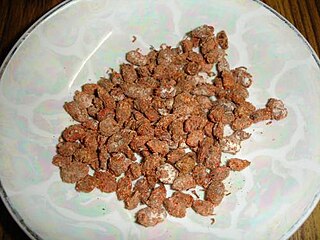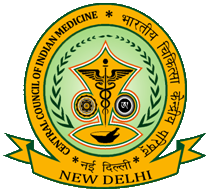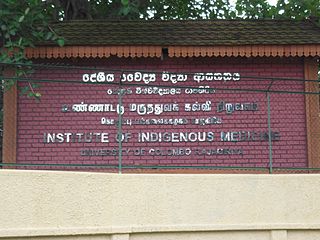Related Research Articles

Ayurveda is an alternative medicine system with historical roots in the Indian subcontinent. It is heavily practiced in India and Nepal, where around 80% of the population report using Ayurveda. The theory and practice of Ayurveda is pseudoscientific.

Allopathic medicine, or allopathy, is an archaic and derogatory label originally used by 19th-century homeopaths to describe heroic medicine, the precursor of modern evidence-based medicine. There are regional variations in usage of the term. In the United States, the term is sometimes used to contrast with osteopathic medicine, especially in the field of medical education. In India, the term is used to distinguish conventional modern medicine from Siddha, Ayurveda, homeopathy, Unani and other alternative and traditional medicine traditions, especially when comparing treatments and drugs.

The history of alternative medicine refers to the history of a group of diverse medical practices that were collectively promoted as "alternative medicine" beginning in the 1970s, to the collection of individual histories of members of that group, or to the history of western medical practices that were labeled "irregular practices" by the western medical establishment. It includes the histories of complementary medicine and of integrative medicine. "Alternative medicine" is a loosely defined and very diverse set of products, practices, and theories that are perceived by its users to have the healing effects of medicine, but do not originate from evidence gathered using the scientific method, are not part of biomedicine, or are contradicted by scientific evidence or established science. "Biomedicine" is that part of medical science that applies principles of anatomy, physics, chemistry, biology, physiology, and other natural sciences to clinical practice, using scientific methods to establish the effectiveness of that practice.

Unani or Yunani medicine is Perso-Arabic traditional medicine as practiced in Muslim culture in South Asia and modern day Central Asia. Unani medicine is pseudoscientific. The Indian Medical Association describes Unani practitioners who claim to practice medicine as quacks.

The Indian Medical Association (IMA) is a national voluntary organisation of physicians in India. It was established in 1928 as the All India Medical Association, and was renamed the Indian Medical Association in 1930. It is a society registered under The Societies Act of India.
The Traditional Knowledge Digital Library (TKDL) is an Indian digital knowledge repository of the traditional knowledge, especially about medicinal plants and formulations used in Indian systems of medicine.

Siddha medicine is a form of traditional medicine originating in southern India. It is one of the oldest systems of medicine in India.
Bachelor of Ayurvedic Medicine and Surgery (B.A.M.S.) is a professional degree focused on Ayurveda offered in India, Nepal, Bangladesh, and Sri Lanka.
The Ayurvedic and Unani Tibbia College, also popularly known as Tibbia College, is an institution under the Government of Delhi, located at Karol Bagh in New Delhi, India. The institution which offers education and training in Ayurvedic and Unani medicine, has its origins dating back to the late 19th century. The college, whose foundation was laid by Charles Hardinge, 1st Baron Hardinge of Penshurst on 29 March 1916, the then Viceroy of India and was inaugurated by the Father of the Nation, Mahatma Gandhi, on 13 February 1921, offers bachelor's and masters (MD) degrees in Ayurvedic and Unani streams.

Homeopathy is fairly common in some countries while being uncommon in others. In some countries, there are no specific legal regulations concerning the use of homeopathy, while in others, licenses or degrees in conventional medicine from accredited universities are required.
The Ministry of Ayush, a ministry of the Government of India, is responsible for developing education, research and propagation of traditional medicine systems in India. Ayush is a name devised from the names of the alternative healthcare systems covered by the ministry: Ayurveda, Yoga & Naturopathy, Unani, Siddha, Sowa Rigpa, and Homeopathy.

Central Council of Indian Medicine (CCIM) was a statutory body under the Ministry of AYUSH, Government of India between 1971 and 2021. The CCIM was set up in 1971 under the Indian Medicine Central Council Act, which was passed in 1970. It is one of the Professional councils under University Grants Commission (UGC) to monitor higher education in Indian systems of medicine, including Ayurveda, Siddha, Unani and Sowa-Rigpa.

The Faculty of Indigenous Medicine of the University of Colombo, specialising in Ayurveda and the Sri Lankan traditional medicine. Founded as the College of Indigenous Medicine in 1929, it became part of the University of Colombo adopting its current name in 1977. It is a premier center of undergraduate and postgraduate study and research into Ayurveda and Indigenous Medicine and Healthcare.

Central Research Institute of Unani Medicine or CRIUM Hyderabad, established in December 1971, is an Indian Government-sponsored Unani medicine research center and out-patient clinic located in Hyderabad, India. The institute was upgraded to National Research Institute of Unani Medicine for Skin Disorders (NRIUMSD), by Shripad Naik, Minister of State (IC) for AYUSH in November 2019. The Institute is well known for its successful treatment in the skin condition of vitiligo, treating more than 150,000 patients.
Krishna Chandra Chunekar was an Indian ayurvedic practitioner and writer, known for the books he published, especially the translation of Vedic literature on herbal pharmacopeia. The Government of India awarded him, in 2013, the Padma Shri in medicine, the fourth highest civilian award, for his contributions.
Vaidya Balendu Prakash is an Indian Ayurveda practitioner. He is a former physician to the President of India and the founder of Paadav, a specialty Ayurvedic hospital in Dehradun. The Government of India awarded him the fourth highest civilian award of the Padma Shri in 1999.
Devendra Triguna is an Indian Ayurveda practitioner, known for his expertise in Pulse diagnosis. He is a former honorary physician to the President of India and the incumbent president of the Association of Manufacturers of Ayurvedic Medicine (AMAM) and the All India Ayurvedic Congress (AIAC). The Government of India awarded him the fourth-highest civilian award, the Padma Shri, in 1999, and followed it up, a decade later, with the third-highest honour of the Padma Bhushan in 2009.
Paneenazhikath Narayana Vasudeva Kurup was an Indian Ayurvedic practitioner, researcher, writer and the founder director of the Central Council for Research in Homoeopathy (CCRIMH). He is a former vice chancellor of the Gujarat Ayurved University, Jamnagar and a former advisor of the Indian Systems of Medicine and Homoeopathy (ISM&H) of the Ministry of Health and Family Welfare. He has published several articles and a book, A Handbook on Indian Medicinal Plants, on the traditional Indian medicine system, The Government of India awarded him the fourth highest civilian honour of the Padma Shri, in 2005, for his contributions to Indian medicine.

The standard entry-to-practice degree in modern evidence-based medicine in India is the Bachelor of Medicine and Bachelor of Surgery (MBBS). Alternative systems of Medicine in India are Ayurveda (BAMS), Unani (BUMS), Siddha(BSMS), Homeopathy (BHMS). M.B.B.S. a credential earned upon completion of a five-and-a-half-year undergraduate program. The curriculum is divided into one year of preclinical studies in general science subjects and three and a half years of paraclinical and clinical studies, followed by a one-year clinical internship. Before beginning the internship, students are required to pass several examinations, the final one of which is conducted in two parts. Postgraduate education in medical specialties typically takes 3 additional years of study after the MBBS and concludes with the award of a Master of Surgery or Doctor of Medicine(MD). Postgraduate diplomas in medical specialities may also be awarded upon the completion of two-year training programs. After that a person can further get a degree in superspeciality in his or her respective branch after successful completion of 3 years of superspeciality in a medical college.
The National Commission for Indian System of Medicine is a Statutory and regulatory body formed by Government of India for framing policies for institutions engaged in Indian System of Medicine and medical professionals. The institution will have Boards of assessment and rating and Board of ethics and registration of practitioners of Indian systems of medicine.
References
- 1 2 "Registered Ayush practitioners not quacks: NIMA". The New Indian Express. 6 December 2016. Retrieved 7 May 2017.